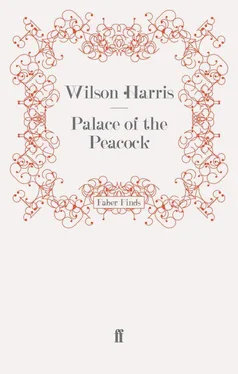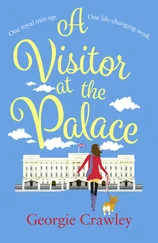Wilson Harris - Palace of the Peacock
Здесь есть возможность читать онлайн «Wilson Harris - Palace of the Peacock» весь текст электронной книги совершенно бесплатно (целиком полную версию без сокращений). В некоторых случаях можно слушать аудио, скачать через торрент в формате fb2 и присутствует краткое содержание. Год выпуска: 2013, Издательство: Faber Finds, Жанр: Современная проза, на английском языке. Описание произведения, (предисловие) а так же отзывы посетителей доступны на портале библиотеки ЛибКат.
- Название:Palace of the Peacock
- Автор:
- Издательство:Faber Finds
- Жанр:
- Год:2013
- ISBN:нет данных
- Рейтинг книги:5 / 5. Голосов: 1
-
Избранное:Добавить в избранное
- Отзывы:
-
Ваша оценка:
- 100
- 1
- 2
- 3
- 4
- 5
Palace of the Peacock: краткое содержание, описание и аннотация
Предлагаем к чтению аннотацию, описание, краткое содержание или предисловие (зависит от того, что написал сам автор книги «Palace of the Peacock»). Если вы не нашли необходимую информацию о книге — напишите в комментариях, мы постараемся отыскать её.
Palace of the Peacock — читать онлайн бесплатно полную книгу (весь текст) целиком
Ниже представлен текст книги, разбитый по страницам. Система сохранения места последней прочитанной страницы, позволяет с удобством читать онлайн бесплатно книгу «Palace of the Peacock», без необходимости каждый раз заново искать на чём Вы остановились. Поставьте закладку, и сможете в любой момент перейти на страницу, на которой закончили чтение.
Интервал:
Закладка:
The Jonestown catastrophe is absorbed into, made part of, a possibly liberating project described by Bone in a letter to someone called WH (Wilson Harris?). One of Bone’s vatic and seemingly unclear statements makes sense in relation to this novel, and is a kind of guideline to many of the late novels: “Keys to the Void of civilisation are realised not by escapism from dire inheritances, not by political glosses upon endemic tragedy, but by immersion in the terrifying legacies of the past and the wholly unexpected insights into shared fates and freedoms such legacies may offer.”
Those who read Harris regularly look up to him as a mystic and guru, an inspiring presence exuding a force more powerful than the literal meanings of his words. Those who write about him are drawn to include in their accounts, as I have done above, an unusually high proportion of explication. Most Harris critics feel that what he is saying is important and that it is one of their functions to explain it to the reader. For such critics, the labour and difficulty of form and language reflect the uniqueness and the arousing quality of the author’s vision. They recognise also a radical intention. Since the “medium” has been conditioned by previous use and framed by ruling ideologies, there has to be an assault upon the medium including not only the form of the novel but also the premisses about language that are inscribed in the novel.
In what follows, however, I want to suggest that while Harris’s novels are unusual he is not hard to read. If we think of Palace of the Peacock as a book about who is Donne and what happens to him, nearly every other level of significance will float into our consciousness. When Donne first came to the interior, Mariella existed “like a shaft of fantastical shapely dust in the sun, a fleshly shadow in his consciousness”. This excitement and mystery couldn’t last. Donne lost it. He disintegrated. He became consumed with conquering and crushing the region and enslaving the native Indians.
In a weak (or is it strong?) moment later in the novel, Donne tells the narrating person: “I am beginning to lose all my imagination save that sometimes I feel I’m involved in the most frightful material slavery. I hate myself sometimes, hate myself for being the most violent taskmaster — I drive myself with no hope of redemption whatsoever and I lash the folk. If they do murder me I’ve earned it I suppose …”
The abused and reduced woman we first see emerging barefoot from a shack to feed Donne’s chickens is a relic of the conquistador’s first dream. He looks at her now “as at a larger and equally senseless creature whom he governed and ruled as a fowl”. The first thing we recognise is this. He was her man, and he did her wrong. She became his executioner or hangman.
Whatever device Harris is using, he is using it in his own way. For much of the book, it is Donne who is the centre of interest, not the I-narrator. Possible themes relating to Donne suggest themselves at an intimidating rate. Donne as conqueror. Effect of conquest on conqueror. Effect of conquest on conquered. Sex, power and imperialism. Woman turned into object. Abuse of the female. Love, and degradation of love. Imagination as creative release. The themes jostle one another. But after all this, the scene dissolves as in a movie. The I-narrator has been dreaming after all. Donne enters his room. We are in the third paragraph. It is becoming clear. Harris is a writer of the multi-media age, and a writer linking neglected resources from traditional societies with newer ones. Writing and the cinema. Writing and painting. Writing and music. Writing and sculpture and dance. Carnival, limbo, Amerindian bone flute.
The book does not allow us to take the dreamer simply as a narrating device. The I-narrator is fascinated by Donne, who we learn is his brother: “His name was Donne, and it had always possessed a cruel glory for me. His wild exploits had governed my imagination from childhood. In the end he had been expelled from school. He left me a year later to join a team of ranchers near the Brazil frontier and border country. I learnt then to fend for myself and he soon turned into a ghost, a million dreaming miles away from the sea-coast where we had lived.”
The I-narrator also lusts after Mariella. The scene dissolves again. Donne’s entry was part of the dream. The I-narrator wakes up. Mariella is beating her hand on his door. He had noticed earlier “the back of her knees and the fine beautiful grain of her flesh”. He is drawn to this attractive and dishevelled phantom: “She lifted her dress to show me her legs. I stroked the firm beauty of her flesh and touched the ugly marks where she had been whipped. ‘Look’, she said, and lifted her dress still higher. Her convulsive sobbing stopped when I touched her again.”
The I-narrator … No. Dreamer. Better call him dreamer from now on, because we find out as the work goes on that the whole thing is a dream. The dreamer turns away from Mariella’s black hypnotic eyes as if he is blinded by the sun. But the fury of her voice is in the wind, like the bullet that killed Donne. And in the haze of his blind eye she is “a watching muse and phantom whose breath was on my lips”.
At this point we don’t know what is dream and what is waking. But everything feels real, and that is what matters. Harris’s novels are a challenge to our notion of what is real, a challenge to our notion of Time and to our earthly Geography, a challenge to our values, a challenge to our static view of language, a challenge to our reductive view of persons, animals, objects, place. A challenge to sign “a profound treaty of sensibility” between ourselves and all of them. A challenge to snatch an insight into “the numinous character of all things, all features, all aspects of being”.
A challenge also to the various kinds of death or finality we accept in the absence of such a treaty. A challenge to tribalism and to fundamentalist assumptions of pure racial ancestry. As previously mentioned, the book lists and names all the members of Donne’s crew who are heading towards the Mission at Mariella. They are distinct and vivid individuals. They represent the whole spectrum from Amerindian and White West Indian to Africans of various hues, Portuguese, and several mixtures — all the people who ever came to these islands. But it is not historical identity that Harris is primarily concerned to establish: “The whole crew was one spiritual family living and dying together in a common grave out of which they had sprung again from the same soul and womb as it were. They were all knotted and bound together in the enormous bruised head of Cameron’s ancestry and nature as in the white unshaven head of Schomburg’s age and presence.” Palace of the Peacock is the first clear expression of the existence and the desirability of our cross-culturalism.
The dreamer realises that he and Donne and Donne’s crew are all in the same boat, on the same quest, dying and being born over and over again on their journey to El Dorado, the peacock palace, the dream of heaven, the dream of love on this brittle earth: “I saw with a thumping impossible heart I was reliving Donne’s first innocent voyage and journey into the interior country … [Donne] was glad for a chance to return to that first muse and journey … And with his miraculous return to his heart’s image and lust again, I saw — rising out of the grave of my blindness — the nucleus of that bodily crew … They had all come to me at last in a flash to fulfil one self-same early desire and need in all of us.”
What is the good of all this? Harris’s novels are just the thing if you find yourself suspended in a tide of superficialities, materialism, economic determinism, repetition, division and strife. Just the thing if the world seems flat and stale and you are afraid of undiscovered countries. Just the thing if you are so caught up in the day to day that you feel you are in danger of distrusting what is nebulous in your life and your self just because it is nebulous and unbound. We are made to look with fear and trembling on the devil called Donne because in this one body Harris locates so much of the cynicism, the self-destructive violence, the drive for power and possession, as well as the unacknowledged guilt and unhappiness of many people lost in the world today.
Читать дальшеИнтервал:
Закладка:
Похожие книги на «Palace of the Peacock»
Представляем Вашему вниманию похожие книги на «Palace of the Peacock» списком для выбора. Мы отобрали схожую по названию и смыслу литературу в надежде предоставить читателям больше вариантов отыскать новые, интересные, ещё непрочитанные произведения.
Обсуждение, отзывы о книге «Palace of the Peacock» и просто собственные мнения читателей. Оставьте ваши комментарии, напишите, что Вы думаете о произведении, его смысле или главных героях. Укажите что конкретно понравилось, а что нет, и почему Вы так считаете.












